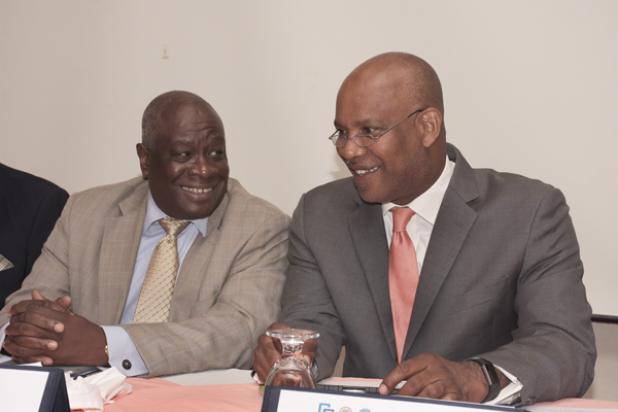
Chief Justice of Barbados, Sir Marston Gibson (left), in conversation with Attorney General and Minister of Legal Affairs, Dale Marshall Q.C., during the opening of the Drug Treatment Court (DTC) Training Workshop.
LESS EXPENSIVE
THE island’s top judge, Chief Justice Sir Marston Gibson, is of the view that drug treatment can be more cost effective than the incarceration of the drug offender.
He was at the time addressing the opening of the Drug Treatment Court (DTC) Training Workshop, held at the Savannah Beach Hotel yesterday.
Judges, magistrates, defence attorneys, prosecutors, probation officers and drug treatment providers were exposed to the training, which was part of the response under the Drug Demand Reduction (DDR) component of the 10th European Development Fund (EDF) Crime and Security Programme between the European Union and CARIFORUM.
“When the studies are done, we will discover that it is more cost effective to treat than to punish,” he stressed, pointing to the cost of incarcerating one person at Her Majesty’s Prison Dodds, which is approximately $30 000 to $35 000 a year.
“If you multiply that by 1 200, you come to a pretty penny. So, it means even if you sentence someone to six months, you are spending between $15 000 to $17 500 on their upkeep, and you are just keeping them in prison, you are not treating them.”
The Chief Justice explained that the idea of a Drug Treatment Court is centred on treatment and the need to return that person to, at least some semblance of respect in society.
“As I said before, addiction is a neurological issue. A lot of people believe that you can tell the person to just ‘kick the habit’, but it does not work that way. What addiction does is that it completely rewires the neural pathways in your brain, with the result that trying to ‘kick the habit’ is difficult, and what it means is that incarcerating the person does not help – what is needed is treatment.”
Sir Marston also highlighted that one of the main challenges with the DTC in Barbados as indicated by DTC Judge, Magistrate Graveney Bannister is the need to strengthen the treatment team.
“We need to get more people from the Probation Department to produce the reports…”
Attorney General and Minister of Legal Affairs, Dale Marshall QC gave the assurance that the new government will fully support the efforts of the Drug Treatment Court.
Moreover, he expressed concern that Magistrate Bannister is only able to sit in the DTC once a month.
“I somehow suspect that he would rather be immersed for longer periods of time in the Drug Treatment Court, so that we can really see the full benefits… .To the extent that it is possible, we may have to make a few changes, but I give you my assurance that I will strain every sinew to ensure the opportunity to devote more time to that particular enterprise.
“This court will really only achieve the results that we need if the government stands fully behind it, and I give you my commitment to stand fully behind the court,” he said.
The activity is being carried out under the leadership of the Executive Secretariat of the Inter-American Drug Abuse Control Commission (CICAD), Secretariat for Multidimensional Security, Organization of American States (OAS) and the CARICOM Secretariat.
